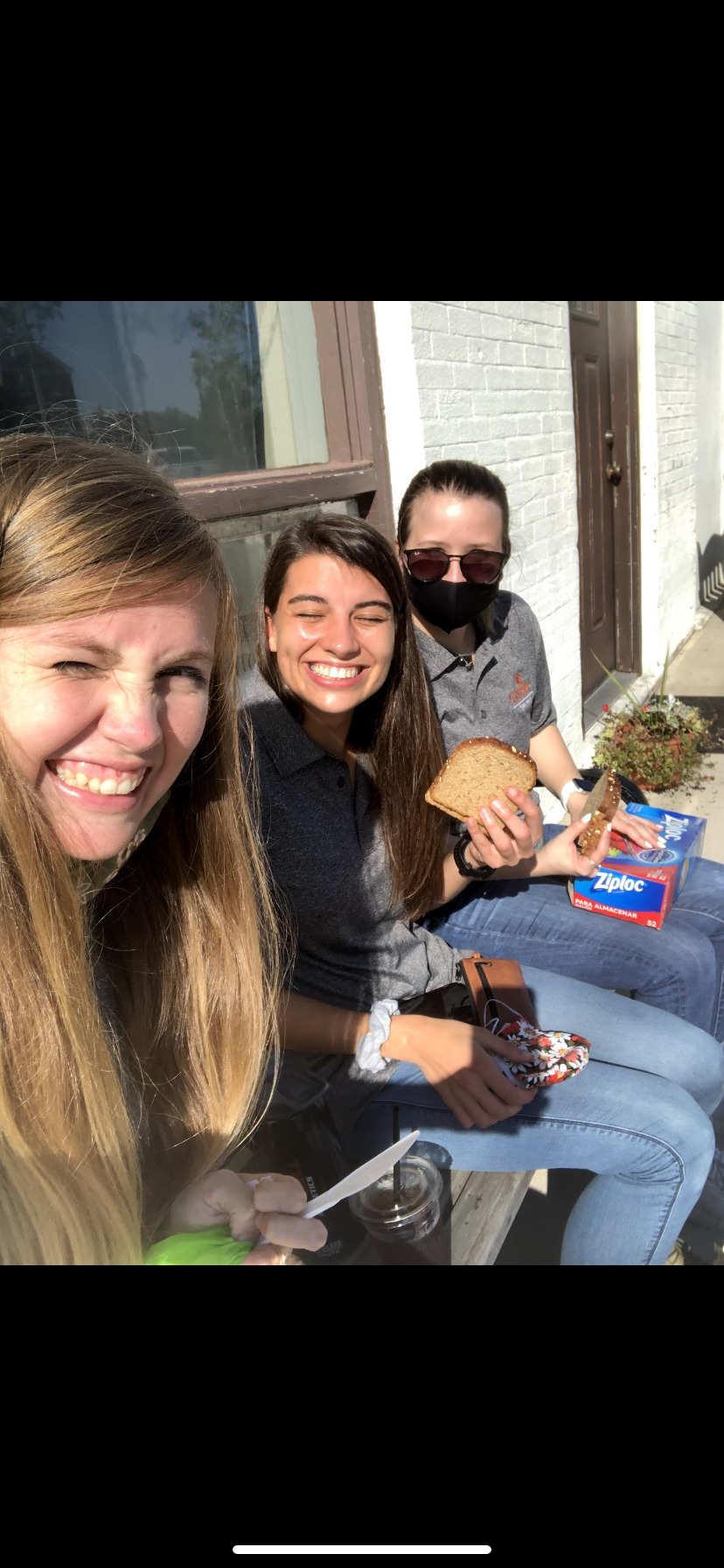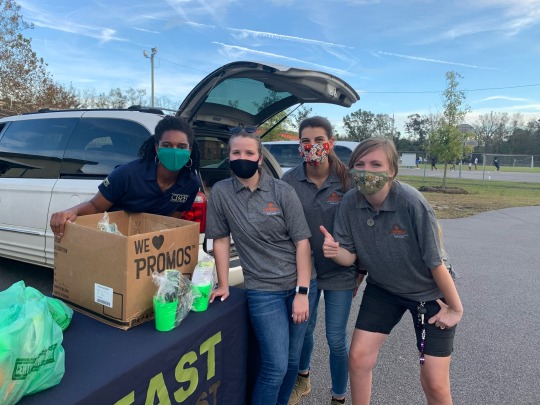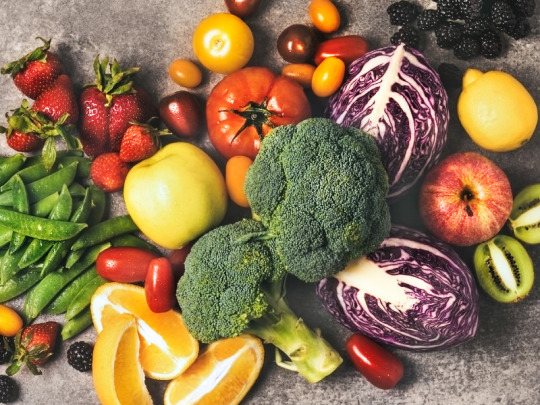Text
Macro Post #4
From Competency Matrix: Competency 20: Describe the importance of cultural competence in communicating public health content
Competency F19: Communicate audience-appropriate public health content in both writing and through oral presentation
For this practicum experience, Team Feast was able to work alongside our preceptor at Feast Down East, which is a nonprofit organization that serves in helping fight food insecurity among eastern North Carolina. Being able to work with this organization help to create lasting skills in working within a community and communication public health content to other professionals along with the community itself.
Within our classes, we have come to the understanding the culture within rural communities can be different and vast from urban culture. Having an understanding of that and being able to give information back to the community in a way that they will understand and appreciate is essential.
Team Feast was able to create a Need Assessment, which was created to be appropriate for the target audience. Food insecurity and food needs can be very sensitive topic for individuals, especially when asking about things like if they can provide enough food for their families. Creating a culturally competent survey was important so that we asked questions that were relevant for the audience and respectfully asking hard questions. Another way for us to culturally competent in our needs assessment creation was keeping in mind the fact that Pender County has a decently large population of Spanish speakers. This was important to keep in mind to be inclusive of that population and adapting a needs assessment in which they can take as well and that we can collect data from that population. Creating a Needs Assessment that hide the shielded the identity was also important for people to be more honest in their answers and decreases risk of any of that information to be tied back to them.
Deliverables that were created for this program were created to be happy and welcoming to be able to draw in more individuals. We also employed the use of lower education level writing and pictures to help get the point across with more clarity. Posters that were created for our drive through event were also translated into Spanish and English versions to be able to reach a wide net of the population within Pender County. Also having a Spanish speaking intern at our event was very helpful in providing assistance to those individuals instead of isolating them, helping us to maintain and demonstrate cultural humility.
The biggest take aways that I received from this project was that anyone can be impacted by food insecurity. Being respectful and understanding toward such an important topic is important when trying to provide help to those populations. There are many unique challenged that rural communities endure such as lower income, lower education, transportation and isolation issues that impact their ability to get proper nutrition. Just because you live in a rural place that is surrounded by food does not necessarily mean that you have access to it. Working with Feast Down East helped to show the meaningful and impactful organizations that are out there that are helping people in various ways. In one way they help to target food insecurities and promote healthy eating, but they also help to keep alive local farmers and business connecting the community altogether as one.
I had a very impactful experience working with Feast Down East and the ladies within my team. Even though we all have different futures ahead of us with different goals, we can still come together for one very important aspect and that is helping people.
@drtillman
1 note
·
View note
Text
Macro Post #3
Competency R1 - Differentiate the impacts of social determinants of health that contribute to health disparities in rural communities as compared to urban communities.
This semester our class has spent a lot of time understanding social determinants and the impact that they can contribute to health disparities particularly within rural communities. Working with this practicum group, gave us first-hand experience to see the social determinants in play and how they impact individuals health and well-being. This semester we got an understanding of Pender County and the disparities that individuals experience within such a rural county.
The outreach event that we created for our project with Feast Down East was a community drive through event. Which we were able to host with the help of many of the different partners that we were connected with through Feast Down East and our initial survey. The drive though event was done to be able to give out food and supplies that tend to be at higher need within Pender County. The event had many challenges and successes such as the location. We had to move the location last minute with only 5 days to be able to get work out about the event to the community. The success was that even with the delayed information we still were able to host and serve about 180 individuals within an hour’s time. Another challenge that was faced within this event was the fact that we eventually had to start turning people away due to the fact that we eventually ran out of food. I think that this event was more successful than anyone within our group would have thought was possible. We were able to get firsthand experiences to be able to see the disparities and determinants in health with event individual we served.
Throughout this class we learned specifically the social determinants of health that impact rural communities. Rural communities tend to be of lower education background, lower income and tend to be hard to get reliable transportation. Poverty rates tend to be higher within rural communities meaning that their access to nutritional food can also be lacking. Social determinants such as this can impact individuals in making the food insecure, causing obesity and other chronic diseases. When people have lower income, they are not always able to get the proper nutrition, and if they have lower education backgrounds, they may not have the knowledge of the importance of have certain nutritional options. Transportation leads to big determinant within rural communities, as discussed in class transportation in rural areas is harder due to dangerous conditions and longer periods of time on the road. People will tend to have to travel further to get to the grocery store, which can lead to people not going to the store as often or purchasing items which can stay edible for longer periods of time.
I am very thankful to be able to experience and help to be able to put this event on for the local community of Pender County. To help them get the healthy foods that are needed to be able to live a healthier live was inspiring and so important. Having understanding of the social determinates and their impacts is important it is completely different were you get to put your learnings into real life experiences. I felt inspired helping the community who was impacted by food insecurity. It was crazy to be able to see the amount of people that are impacted by food insecurity within such a small location. It makes you really think about how even the richest of counties is still plague with food insecurity and limited access to safe and healthy foods. Food insecurity is a critical Public Health topic and with help from organizations like Feast Down East, we are getting closer to being able to combat food insecurity within America.
@drtillman
1 note
·
View note
Text
Macro Post #2
Competency F14 - Advocate for political, social, or economic policies and programs that will improve health in diverse populations
For part of the practicum experience our team was asked to create a advocacy component to our project. Feast Down East, which is a nonprofit organization that targets food insecurity, wanted us to advocate for a particular bill known as Bill S.4202. Bill S.4202 was recently introduced into the Senate, this bill is for the expanding of SNAP benefits, also known as ““Expanding Snap Actions Act of 2020.” To be able to create this advocacy campaign was slightly challenging due to COVID-19 regulations, so our group created an online social media campaign to raise awareness for this bill.
To be able to understand this bill, one must have an understanding of SNAP, which unfortunately not all North Carolinians know about. SNAP stands for Supplemental Nutrition Assistance Program. A federal program that helps millions of low-income families put food on the table according to Feeding America. The one flaw to this is that SNAP benefits tend to be limited in which people cannot always get the most nutritional and healthy foods with SNAP benefits. SNAP is eligible for our communities most at-risk citizens, mainly serving children, elderly or disabled members. Limited to individuals with gross income up to 130% of the federal poverty line (income less than $2,633 per month for a family of four) according to Feeding America. There are many other limitations to SNAP program mainly being the fact that the system that is needed to be able to bill SNAP particularly online is very expensive and many retailers especially local retailers cannot afford this system. This is where Bill S.4202 comes into play, originally introduced by Dick Durbin and Tammy Duckworth, two U.S. Senators in Illinois. The bill was proposed for community members to be able to have more access and utilization of SNAP benefits on online platforms. This concept is particularly important given the current climate with the COVID-19 pandemic.
Food insecurity and access to healthy foods was already a huge public health issue before this pandemic started and now has become even more of an issue. Many Americans use SNAP as their primary payment for groceries when the pandemic started, retailers were limiting the number of individuals that were allowed in the store and with the inability to be able to use online platform, due to the fact that only major companies have the online software to take SNAP benefits online, such as Amazon, this left a large part of Americans risking it to be able to the grocery store. Due to financial and technological struggles many local retailers cannot use online platforms which in return impacts the local businesses and individuals access to food.
This bill has never been more important than it is right now, admits the COVID-19 pandemic, when everything is about being social distanced and quarantined. This bill being passed would be vital for individuals to get access to clean, healthy foods from local retailers to have more access to food. The main purpose of this act is to be able to provide more affordable option to be able to get this online platform to be able to bill SNAP benefits.
The advocacy event was created in hopes to get community members involved to take this to our local senators. We created two back to back events created via Facebook, in which we developed a email template to be able to send to state government officials and our senators on the same day to be able to give movement to this bill. All though we wanted this advocacy project to be a success, it lacked a little bit of attention. To be able to spread the word especially within Facebook is a lot harder than it looks. It would have been great if we could have gotten just a smidge more people to help really support and push for this essential bill. Even though there was a lack of participation I think that was a great learning experience for our group to really do the research and push for an advocacy and change that we want to be able to see to impact the community.
@drtillman
1 note
·
View note
Text
Macro Post #1
Competency F7: Assess population needs, assets, and capacities that affect communities’ health.
Food Insecurity can be a complex topic to talk about sometimes. It can be hard to understand the actual meaning of food insecurity is known as “the availability of nutritionally adequate and safe food or the ability to acquire acceptable foods” as stated in Warren & Smalley text. This means that just because communities may have access to foods, they may not have access to necessarily health foods. With how important it is to be able to help individuals live healthier lives and have access to healthy foods, I teamed up with Team Feast to work Feast Down East to be able to assess food assess and insecurity within Pender County, North Carolina.
Feast Down East is a non-profit organization that was based on a UNCW economic development project. It was created in 2010 to be able to help create programs that can help support farm business, distribute local produce and increase access for all consumers. They also work to be able to educate the communities on the importance of buying healthy local produce. Feast Down East is based out of Wilmington but works within and with eleven counties within North Carolina. Including Bladen, Brunswick, Robeson, Pender, Onslow and Sampson counties. For this practicum experience, Feast Down East wanted the team to be able to branch out into Pender County since they did not have as much information and programs working within Pender. The main goal for us was to be able to determine the food needs within the community. To be able to understand the community and accomplish this goal, we created and distributed some surveys to help us gain some insight into the community. We started off this project by creating and delivering an initial survey that was sent to community partners who already worked within Pender. This helped us to gain insight in what was needed to be understood from the Needs Assessment that we were developing, and to figure out exactly the best format and way to get the community involved. The partners that we establish were a various of groups such as food banks, farmers, churches and social services. They gave us some very insightful information in the important questions that needed to be asked such as questions about where they get their food, if they participate in any social services, transportation and the immediate needs families had. We also used this initial survey to be able to get an idea of who would be willing to distribute the survey among the community. Out of the 17 responses 14 partners agreed to distribute our needs assessment.
The Need Assessment was created based on previous food needs assessments resources and based off of the initial survey responses. The total question count for the needs assessment was 67 questions, which would become a later challenge due to the length. When something is too long people may get lost, not want to finish it or not be willing to take it all. It was a hardship to be able to develop a needs assessment with all the factors in mind. The purpose of this needs assessment was to be able to get good insight into the food needs in Pender County. To do this we created the survey in a couple of different formats to be able to get more people participation. It was developed in online format and hard copy format, and in both English and Spanish translations. One partner of Feast Down East, Liz Peterson, who worked with NC Cooperative Extension was able to distribute the needs assessment to over 1,700 people. This would be helpful for us to be able to get a good amount of feedback to be able to have a true understanding of the food needs. The responses that were received was approximately 100, which were not all completed. This data will then be analyzed and help us to be able develop a meaningful event for Pender county.
Food insecurity tends to be higher in rural areas where most of food is usually grown for the rest of the county. (Warren & Smalley, 2014) Food insecurity can look different within a rural context because of the disparities that many rural counties can face. It can be caused due to the lack of resources, poverty, and lack of education among many other factors. The importance to understand food insecurity within Pender county is essential because it will help to be able to provide communities within better access and availability. I think that with this group we can be able to make a great Impact in Pender County with the help of our preceptor at Feast Down East and all of the local resources.
References
Feast Down East. (2020). www.feastdowneast.org
Warren, C. J., Smalley, K. B. (2014). Rural public health: Best practices and preventive models. New York: Springer Publishing Company.
@drtillman
1 note
·
View note
Photo

Week 11: The final week of getting to work with these amazing ladies. It was such a great semester getting to know and work with like Lize, Elisa and Marisa (not pictured). Throughout all of the challenges and experiences shared this could not have been a better group. We spent the last week prepping for the final presentation and developing our video. @drtillman
1 note
·
View note
Photo

Week 9 & 10- Team Feast worked hard getting through all of the data analysis for the Pender County Needs Assessment. Diving through all of the data to make readable and comprehensive visuals to put into our deliverables to give back to Feast Down East and our helpful partners! This was a great learning experience and really help to hon our skills. @drtillman
1 note
·
View note
Text
Week 8: On October 28, team FEAST hosted a community drive thru event. It hosted 182 people. Helping the Pender community get essential food needs! With all its challenges, the event was a great success!

@drtillman
1 note
·
View note
Text

Week 7: Team Feast got our community assessment sent to 1700 individuals through our partners at the NC Extension office. Our assessment was given to community members in both English and Spanish translations to help to reach more of the community members! So far on our qualtrics assessment (online) we have approximately 30 completed surveys and growing. The survey is open for two weeks so hopefully we will get a wide variety of participants! Looking forward to analyzing all the data that we get from the community memebers on their food needs!
@drtillman
1 note
·
View note
Text

Team Feast finally got the Need Assessment finalized for the Pender Community. It was sent to our preceptor for distribution to community members. This was a very successful week on week 6.
@drtillman
1 note
·
View note
Text

Week 5: Team Feast got to be in contact with the Pender County Council Team. Communicating with the community leaders gave us a great sense of where to move forward with our outreach project for the community.
@drtillman
1 note
·
View note
Text

This past week, team FEAST, met with our practicium advisor. This meeting was for discussing how to distribute the needs assessment to community. Lots of editing the needs assessment and deciding what exact to put into the assessment. Excited to get the needs assessment finalized and get out to the community! @drtillman
2 notes
·
View notes
Text

This week team feast worked on reaching out with local community partners to get their input on the needs assessment for the community. This week we will start forming the needs assessment for the community in which we will be distributing! We are looking forward to determining the needs in Pender County when it comes to food insecurity. @drtillman
2 notes
·
View notes
Text

For this week with TEAM FEAST we continued with the research guide for the needs assessment. Continued with research on Pender County needs for food insecurity. Moving onto to meet with preceptor for next steps this week. @drtillman
1 note
·
View note
Text

Team Feast prepared this week for next upcoming meeting with research and organization. Excited to get started. @drtillman
2 notes
·
View notes